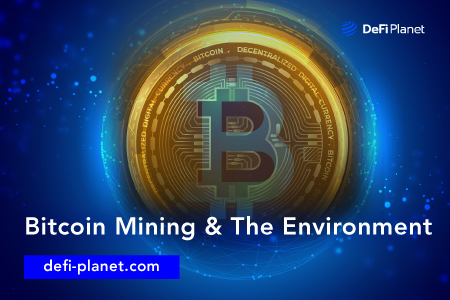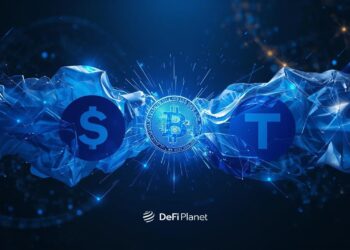Last updated on December 1st, 2021 at 06:49 pm
Ever since the release of the Bitcoin whitepaper over a decade ago, the interest in blockchain technology has grown exponentially. The space is maturing and now covers a myriad of projects, cryptocurrencies, smart contract functionalities, Decentralized Finance (DeFi), Non-Fungible Tokens (NFTs), yield farming, Decentralized Autonomous Organizations (DAO), and many more.
New Bitcoin must be minted and added to circulation through the Proof-of-Work consensus mechanism whereby miners compete to solve complex mathematical puzzles. While ordinary home computers were initially sufficient for mining Bitcoin, intense competition between miners now means that only highly specialized, energy-intensive equipment is used to mine Bitcoin. In fact, some Bitcoin mining companies are listed on major stock exchanges. The process of Bitcoin mining expends a significant amount of energy.
Though mining is an important part of Bitcoin’s existence, environmentalists argue that the process has degrading effects on the environment. But crypto enthusiasts have also raised counter-arguments.
In this article, we will briefly look at the bitcoin mining process and seek to set out both sides of the argument.
What is Bitcoin Mining?
Bitcoin mining is the use of high-powered computational mechanisms to add new bitcoins to circulation. The process is designed to reward so-called miners for maintaining the Bitcoin blockchain and validating transactions on it. The process is painstaking and pretty expensive because it requires complex infrastructure that has high energy consumption.
Mining, in simple terms, is the addition of bitcoins and verification of transactions in the bitcoin blockchain. The Bitcoin blockchain is a shared ledger containing a growing list of blocks (i.e. a collection of transactions) cryptographically linked together in a database. The addition of new blocks to the growing chain, therefore, forms the basis of bitcoin mining.
How Mining Works
According to Open Node, bitcoin transactions are not immediately added to a new block after they occur but are moved to a memory pool. Miners then select unconfirmed transactions from the memory pool and add them to a temporary block termed candidate block. However, the candidate block may be eventually discarded if it does not get verified.
Each transaction added to the candidate blockchain is hashed to get a transaction ID. Each transaction is then paired and hashed again to give another transaction ID. Repeating the process gives a final hash value called Merkle root, which represents all the other previous hashes. This repetition prevents the manipulation of transactions.
After the candidate block is formed, miners race to solve complex mathematical puzzles to find a target hash. The miner then uses the nonce to find the hash of the next block.
NB: A nonce is a 32-bit or 4-byte only data in the entire block that can be changed. The nonce that finds the hash of the next block is called a ‘golden nonce’.
Any hash that is above the target hash is rejected and will not be used to create a new block. The reverse happens when a hash found is below the target hash.
The blockchain network then accepts the new block and the miner is compensated with freshly mined Bitcoins. This compensation is called a reward.
Bitcoin Halving, Mining pool, and Difficulty
Bitcoin Halving
Miners are usually rewarded with freshly mined Bitcoin added to the network. But Open Node adds that the Bitcoin money system is designed in a way that for every 210,000 blocks mined, a miner’s reward is reduced by half. This process is known as halving.
It takes roughly four years to mine 210,000 blocks. With miners’ reward currently pegged at 6.25 BTC, this value is expected to reduce to 3.75 BTC after the next halving.
Halving is peculiar to Bitcoin as other altcoins do not have a central authority that controls the monetary system. This explains why Bitcoin has a fixed supply of 21 million coins.
Mining pool
In the mining pool, miners do not mine for just themselves but enter the pool where they combine hashing power. This is more efficient and allows miners to avoid doing double the work.
The mining pool distributes cryptographic puzzles among the miners and when a miner finds the golden nonce, the pool wins the reward. The reward is shared to the hashing power introduced to the pool by the miners in a proportionate manner. Because mining pools are not discriminatory, anyone can join.
Bitcoin mining difficulty
Bitcoin mining difficulty is a measure of how difficult it is to find the golden nonce under the target hash. The difficulty is adjusted after an approximate number of 2,016 blocks are created, which takes roughly two weeks.
Mining difficulty is set by nodes and the algorithm is integrated into the Bitcoin protocol. If the aggregate hashing power of the nodes changes, the mining power changes accordingly.
Impact of bitcoin mining on the Environment
Though Bitcoin has grown and its adoption is impressive, major questions about the high energy consumption and carbon emission have been raised. Environmentalists argue that the carbon emitted has an impact on climate change. However, this allegation is strongly refuted by many industry insiders and commentators.
As mining difficulty increases, the network will need more energy to verify the same number of transactions available when difficulty was lower.
Is it really that bad?
Remember the tweet by Elon Musk around the second quarter of 2021…
“We are also looking at other cryptocurrencies that use <1% of bitcoin’s energy/transaction.”
It sent Bitcoin prices crashing after being on an all-time high since the beginning of 2021.
A mining map from Cambridge University shows that in the last six months, the process changed, especially with China’s crackdown on miners — which took many miners offline. This translated into fewer miners, less power consumption, and the elimination of inefficient hardware from the blockchain space.
“The bitcoin network is ruthless in its drive for the lowest cost. Miners around the world are looking for stranded power that is renewable. That will always be your lowest cost. Net-net this will be a big win for bitcoin’s carbon footprint,”
-CNBC quotes Mike Colyer, CEO of digital currency company Foundry
The overall Bitcoin network, according to Colyer, will now be mostly made up of more efficient rigs that get about double the hash power for the same amount of electricity.
Is Bitcoin bad for the environment?
To address this, we will take into consideration points like energy consumption estimates, electronic and hardware waste, shifting focus to renewable energy, and stranded waste.
Energy consumption in mining
Data from Cambridge Bitcoin Electricity Consumption Index suggests the effect of BTC mining on the environment should not be overlooked.
Prior to May 2021, Bitcoin consumed roughly 133.68 TWh/yr of electricity. Currently, data places that figure at 70TWh/yr, that’s 0.33% of the world’s total electricity production. This is almost half of what it was in May and is equivalent to Chile’s yearly power consumption.
Bitcoin’s yearly 133.68 TWh power consumption makes it comparable with countries like Poland (152.57TWh/year) Egypt (150.58TWh/year) and Malaysia (147.21TWh/year).
Comparing this to payment giant VISA, Statista’s October 2021 data shows that on average, one Bitcoin transaction consumes 1200.86 kWh, while 100,000 VISA transactions spend only 148.63 kWh.
These figures indicate enormous energy consumption. But that on its own is not a problem. However, the carbon emitted from Bitcoin’s energy consumption is what raises environmental concerns.
Hardware and Electronic Waste
Shifting focus from the energy emitted, there are questions of hardware and electronic waste from Bitcoin mining having a negative impact on the environment. In Bitcoin’s early days, miners used central processing units (CPU) in Personal Computers.
These devices had a computing power of less than 0.01 gigahashes per second (GH/s) and an efficiency of 9,000 joules per gigahashes (J/GH). However, these CPUs have been disposed of and 0.1–25 GH/s and 100–45 J/GH machines now dominate the blockchain space.
According to a study by Vries in 2019, Bitcoin mining generates significant quantities of electronic waste because specialized hardware used in mining becomes extinct after roughly a year and a half.
In analyzing e-waste from Bitcoin, the waste considered is that released from the mining equipment that is being discarded.
Focusing on wasted and stranded energy
While little data exists to estimate utilization of renewable energy in Bitcoin mining, the Cambridge Center for Alternative Finance (CCAF) in its 3rd Global Cryptoasset Benchmarking report (2020) estimates that 76% of miners use renewable energy to make up the energy mix.
As part of novel mining strategies, miners use stranded gas — a by-product of oil production that is continually wasted by flaring or venting. Gas flaring and venting have enormous effects on the environment. But if energy-intensive companies, such as Bitcoin mining firms, get to use these wastes, carbon emission will be reduced.
Future of mining with Renewable energy
As part of its economic benefits, Bitcoin mining can encourage the development of renewable energy such as solar. With the use of satellites and wireless internet connections, mining operations can be achieved in remote locations or places that would have been futile economically. Issues associated with traditional extraction of power such as the transportation of energy don’t affect Bitcoin mining in any way.
The positive side of Bitcoin mining to the environment
Utilizing wasted and stranded energy is a positive aspect of Bitcoin mining’s impact on the environment. Using stranded gas that would otherwise have been flared or vented to power energy-intensive infrastructure used in mining will reduce carbon emissions.
Estimates by the World Bank suggest 5.3 trillion cubic feet of natural gas is flared yearly. Rather than waste such waste to carry on, miners can use this energy. It’s like using one stone to kill two birds — reducing carbon emission and reducing the amount miners spend on gas fees.
In Conclusion…
- Mining is an integral part of the Bitcoin network. It facilitates and verifies transactions without the need for a central authority.
- Mining is an expensive investment that requires high-powered computer infrastructures, and electricity.
- Environmentalists have raised concerns about the impact of mining on the environment.
- Electronic waste generated when obsolete mining hardware is discarded is also becoming a source of concern.
- Drawing a conclusion on whether or not Bitcoin mining is bad for the environment is dicey because crypto enthusiasts and skeptics will always have their opinions.
If you would like to read more articles like this, follow DeFi Planet on Twitter and LinkedIn.





















